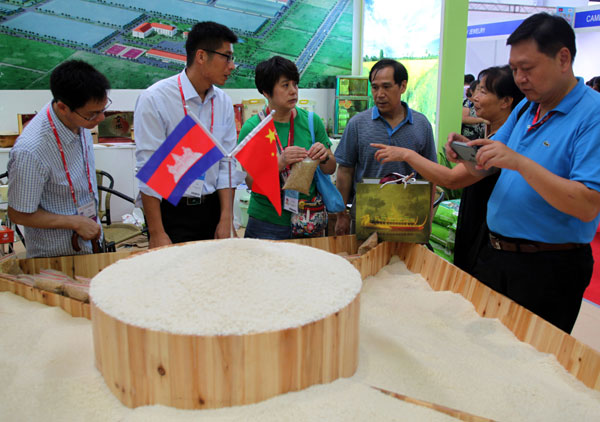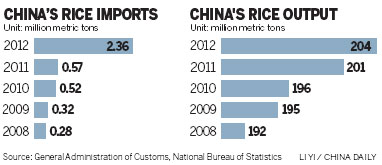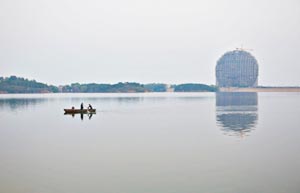

|
 Traders show great interest in rice from Cambodia at the China-ASEAN Expo in Nanning, Guangxi Zhuang autonomous region. China's rice output is expected to drop 0.7 percent year-on-year to 202.8 million metric tons this year. [Photo / China Daily]
|
The government is expected to further lower the bar on rice imports, in a bid to boost the country's food supply, industry experts said.
The China National Grain and Oils Information Center forecast that the country's rice output will drop 0.7 percent year-on-year to 202.8 million metric tons in 2013, indicating the rice production is falling after stable output growth for a decade.

As the world's biggest rice consumer, China imported between 500,000 and 600,000 metric tons of rice per year until 2012, when local prices lost their competitiveness against rice imported from neighboring countries.
Ding Shengjun, a senior researcher at the Academy of the State Administration of Grain, said that adverse weather and floods in major rice-growing regions, such as Hunan, Jiangxi and Zhejiang, have curbed the country's rice output and deepened reliance on imports.
During a visit by Premier Li Keqiang to Bangkok this month, China agreed to raise the amount of rice to be imported from Thailand over the next five years to 1 million metric tons per year.
"After decades of efforts to pursue higher outputs, China's rice sector is seeing a decline in competitiveness," Ding said. "The government has realized that the country's rice farmland needs a break after years of heavy use of fertilizers, pesticides and herbicides."
The country accounts for 26 percent of the world's rice production.
Like other Asian countries, China has implemented policies to encourage rice cultivation by guaranteeing minimum purchase prices. But after almost a decade of increases, rice prices are now well over those seen in international markets.
 Aerobatic team prepare for Aviation Convention
Aerobatic team prepare for Aviation Convention
 China Suzhou Electronic Manufacturer Exposition kicks off
China Suzhou Electronic Manufacturer Exposition kicks off
 'Squid beauty' and her profitable BBQ store
'Squid beauty' and her profitable BBQ store
 A day in the life of a car model
A day in the life of a car model
 Vintage cars gather in downtown Beijing
Vintage cars gather in downtown Beijing
 Asia Bike Trade Show kicks off in Nanjing
Asia Bike Trade Show kicks off in Nanjing
 Student makes race car for 4th Formula SAE of China
Student makes race car for 4th Formula SAE of China
 Beijing suburb to hold 2014 APEC meeting
Beijing suburb to hold 2014 APEC meeting